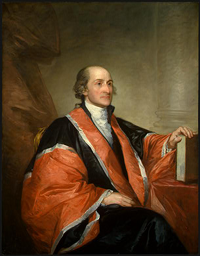John Jay was a member of the Continental Congress from 1774 through 1779, serving as its president in 1778-79. He drafted New York’s first  constitution in 1777, was the chief justice of the New York supreme court in 1777 and 1778. He became the United States minister to Spain in 1779, and signed the final peace treaty with England. He was the US secretary of foreign affairs 1784 to 1789. He was one of the Constitution’s most outspoken proponent, and in 1789, he became the first Chief Justice of the United States Supreme Court and finally, the governor of New York from 1795 until 1801.
constitution in 1777, was the chief justice of the New York supreme court in 1777 and 1778. He became the United States minister to Spain in 1779, and signed the final peace treaty with England. He was the US secretary of foreign affairs 1784 to 1789. He was one of the Constitution’s most outspoken proponent, and in 1789, he became the first Chief Justice of the United States Supreme Court and finally, the governor of New York from 1795 until 1801.
The co-author of the Federalist Papers was elected president of the Westchester Bible Society in 1818, and in 1821, John Jay became the president of the American Bible Society.
In December, 1776, Jay addressed New York’s constitutional convention immediately following the American defeat at Long Island, Manhattan, and White Plains. He told the audience of Americans disillusioned by their losses and questioning the moral righteousness of their cause,
“The Gospel is yet to be preached to those western Regions, & we have the highest Reason to believe that the Almighty will not suffer Slavery & the Gospel to go Hand in Hand. It cannot, it will not be.”
In April, 1794, in a letter to his wife, Sally, he wrote:
“God’s will be done; to him I resign--in him I confide. Do the like. Any other philosophy applicable to this occasion is delusive. Away with it.”
In a letter to Jedidiah Morse, in 1797, he wrote:
“It is to be regretted, but so I believe the fact to be, that except the Bible there is not a true history in the world. Whatever may be the virtue, discernment, and industry of the writers, I am persuaded that truth and error (though in different degrees) will imperceptibly become and remain mixed and blended until they shall be separated forever by the great and last refining fire.”
Now, one could argue that the first Chief Justice of the United States of America is likely to have had a better idea than any of our current Justices as to the intent of the Founding Fathers, since he was one and knew most of them.
In 1811, in a letter to John Bristed, he wrote:
“I do not recollect to have had more than two conversations with atheists about their tenents. The first was this: I was at a large party, of which were several of that description. They spoke freely and contemptuously of religion. I took no part in the conversation. In the course of it, one of them asked me if I believed in Christ? I answered that I did, and that I thanked God that I did."
On October 12, 1816, he said, “Providence has given to our people the choice of their rulers, and it is the duty, as well as the privilege and interest of our Christian nation to select and prefer Christians for their rulers. National prosperity can neither be obtained nor preserved without the favor of Providence.”